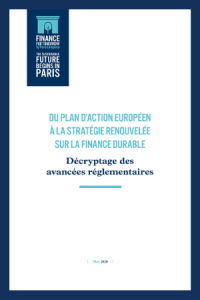From European action plan to renewed strategy on sustainable finance
Read the Decryption
Deciphering regulatory advances
Thanks to the work initiated by the High-Level Expert Group (HLEG) on sustainable finance, mandated by the European Commission at the end of 2016, followed by that of the Technical Expert Group (TEG), sustainable finance is now at the heart of the European agenda. Based on the HLEG’s recommendations, the action plan implemented since 2018 aims to define a global strategy to make sustainable finance the European framework for action, in order to build a low-carbon and inclusive economy.
The structuring impetus provided by the Green Deal, to make Europe the first climate-neutral continent by 2050, is unprecedented. Accompanied by a massive investment plan estimated at 1,000 billion euros from public and private sources, it places the ecological transition at the forefront of Europe’s growth strategy for the next decade.
In this context, the European Commission is currently defining a ‘Renewed Strategy on Sustainable Finance’, accompanied by a public consultation open until July. It aims to reinforce, develop and accelerate the work of the initial action plan, in order to mobilize the public and private financial capital essential to the ecological transition.
In March 2020, TEG’s proposal for a taxonomy of environmentally sustainable economic activities was an essential step. This taxonomy will have to define a common language, which will be a major lever for achieving tangible objectives for transforming the economy and the financial system. It is seen as the foundation on which the development of all ten strategic axes of the European action plan will be based.
Finance for Tomorrow contributes, with its members, to improving the proposal that has been formulated in order to ensure its impact, its ambition and the capacity to implement it, everywhere in the world. The ‘Impact of the Green Deal and the Taxonomy’ working group is coordinating a substantive response to these rich texts in their entirety, to ensure that they are effective in the short and medium term, and that their lasting impact enables the full achievement of the objectives of the Paris Agreement and the UN Sustainable Development Goals. All our members are invited to contribute to the debate in the coming weeks.
This decryption, produced as part of the work of our Policy Commission, is intended to provide an overview of the regulatory advances of the action plan, in order to help economic and financial players take ownership of them, discuss them, and participate in their improvement over the coming months. It explains the implementation of the first legislative proposals dating from 2018, presents the ongoing development of norms and standards, and introduces the work of the financial supervisory authorities with a view to the next steps. The aim is both to foster the ability of players to anticipate the introduction of new processes and practices, and to encourage their mobilization within the framework of the European Commission’s work, its public consultations, and the work carried out by Finance for tomorrow and its members to make a constructive contribution.
In the face of the environmental emergency and now the health crisis we are experiencing, the perspectives provided by sustainable finance are becoming more essential every day. The transition to a more sustainable and resilient economy must be a central element of post-COVID19 economic recovery. To achieve this, it is vital to provide the political and regulatory tools to ensure that financial systems genuinely support companies’ transition to sustainability, and to base this objective on the work undertaken by the most committed institutions, both in France and in Europe. This is a key element of the roadmap for the relaunch of the European Council and of the message conveyed by the members of the technical expert group on sustainable finance. It is also the ambition that Finance for Tomorrow intends to pursue.

